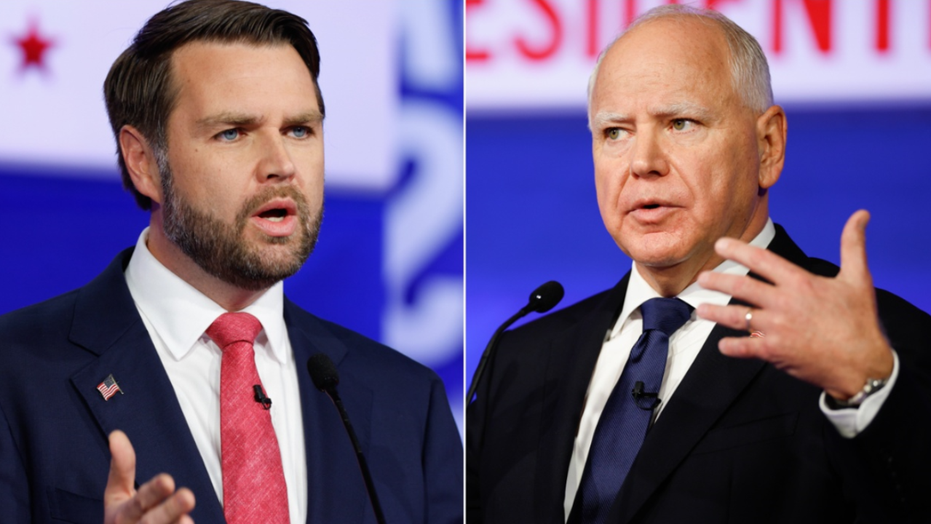
US Polling Nostradamus Reveals Who He Thinks Won Vice Presidential Debate
Historian Allan Lichtman has voiced his thoughts on Tuesday's vice presidential debate.
Election "Nostradamus" Allan Lichtman has described Tuesday night's vice presidential debate as "bipolar" and identified a tipping point that decided the winner.Republican vice presidential candidate JD Vance went head-to-head with his Democratic counterpart Tim Walz yesterday, in what is likely to be the last debate this election cycle.Historian Lichtman, who earned his nickname due to his impressive track record of predicting presidential election outcomes, picked his winner in a YouTube livestream late Tuesday. Earlier, Ohio Senator Vance and Minnesota Governor Walz had put forward their perspectives on issues including the Middle East conflict, climate change and abortion, in a relatively cordial and policy-focused standoff.Lichtman said it was a "bipolar debate," adding: "The first 20 minutes I thought Vance had a slight edge. He's very personable, he's very slick, he knows how to make a presentation."Walz looked a little bit nervous, he looked a little bit rattled. Even on a couple of issues that should have been very good for [the Democratic Party] … he didn't really close the deal.""But then there was a tipping point in the debate, a trigger, and that's when they got to reproductive freedom," the professor went on to say."Finally, Tim Walz found his voice and was very persuasive, and very eloquent about reproductive freedom for women."He added: "I think that really tipped the debate. It wasn't a wipeout like I thought Harris wiped out Trump, but I thought Walz had a clear advantage from the last hour, hour and 10 minutes of the debate."Lichtman went on to say that in his view, "while it was not, I think, as clear a difference as in the presidential debate … the balance tipped to Walz.""I'd give Walz about a B, and Vance a C-," he said.Newsweek has contacted Lichtman, Vance, and Walz for comment via email outside of standard working hours.Lichtman has formally predicted that Vice President Kamala Harris will win the 2024 election based on his system—The Keys to the White House.His model hinges on 13 keys, which the professor has said are "based on 120 years of presidential election outcomes."The keys have long been hailed as a reliable predictor of U.S. election outcomes, though the model is not without its critics.These keys evaluate the standing of the incumbent party based on areas such as the economy, foreign policy, and domestic politics, such as social unrest, major scandals, and the presence of a third-party candidate.If six or more of the 13 keys—all true/false statements—are false, the incumbent party is predicted to lose the election. Should five or fewer be false, it is expected to win.The 13 keys, as set out by the historian in a 2012 article for the Social Education journal, are: Party mandate: After the midterm elections, the incumbent party holds more seats in the U.S. House of Representatives than after the previous midterm elections. No primary contest: There is no serious contest for the incumbent party nomination. Incumbent seeking reelection: The incumbent party candidate is the sitting president. No third party: There is no significant third party or independent campaign. Strong short-term economy: The economy is not in recession during the election campaign. Strong long-term economy: Real per capita economic growth during the term equals or exceeds mean growth during the previous two terms. Major policy change: The incumbent administration effects major changes in national policy. No social unrest: There is no sustained social unrest during the term. No scandal: The incumbent administration is untainted by major scandal. No foreign or military failure: The incumbent administration suffers no major failure in foreign or military affairs. Major foreign or military success: The incumbent administration achieves a major success in foreign or military affairs. Charismatic incumbent: The incumbent party candidate is charismatic or a national hero. Uncharismatic challenger: The challenging party candidate is not charismatic or a national hero. Speaking with Newsweek after the initial publication of his prediction, Lichtman said the foreign policy keys were the hardest to predict."You're dealing with two wars—two uncertain wars that are very fluid—which makes those two keys extremely difficult to call," he said."Even if they both flipped against the Democrats, there still would not be enough [false] keys to predict their defeat," Lichtman added."And frankly, I think the most reasonable construction of the foreign policy keys, which does reflect the record of the Biden administration, is that they would be split."Do you have a story we should be covering? Do you have questions about the vice presidential debate or the 2024 presidential election? Contact LiveNews@newsweek.com



0 Comments